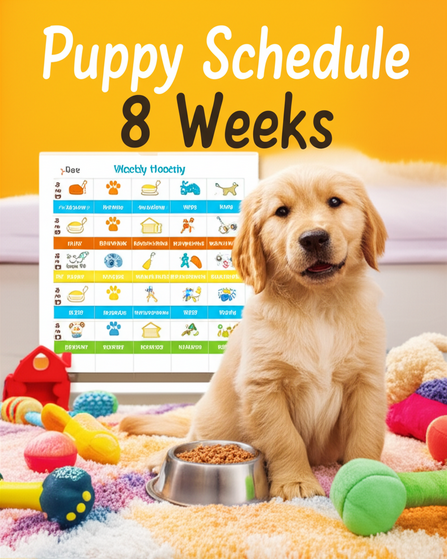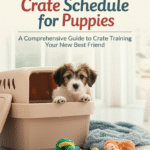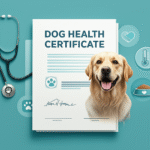Understanding Your 8-Week-Old Puppy’s Development and Needs
At eight weeks old, puppies are truly entering a dynamic phase of their development, marking important milestones critical for their physical growth, cognitive abilities, and social integration. This period sees puppies becoming increasingly independent, displaying a heightened sense of playfulness and an insatiable curiosity about their surroundings. They are rapidly developing crucial motor skills, such as running, jumping, and exploring with more agility and coordination, which are foundational for their overall physical and cognitive maturation. Socially, these weeks are paramount for shaping their future temperament and behavior, as they actively learn about appropriate interactions with humans and other animals. Positive early experiences during this window significantly influence how they will perceive and engage with the world as they grow into adult dogs.
To support this rapid development, the basic needs for 8-week-old puppies revolve around four key pillars: nutrition, environment, health care, and training. Providing a balanced diet, rich in proteins, healthy fats, and essential nutrients, is paramount to support their vigorous growth and high energy levels. Choosing the best dog food specifically formulated for puppies is a non-negotiable step to ensure they receive all necessary building blocks for strong bones, healthy organs, and a robust immune system (DogsCare.life – Best Dog Food for Puppies: Choosing the Right Nutrition). Alongside nutrition, creating a safe, warm, and comfortable living space with constant access to fresh water is crucial for their well-being and sense of security.
Routine veterinary care, including a timely vaccination schedule and regular deworming, is essential to protect these vulnerable young animals from common puppy diseases during this susceptible period. Early, positive training experiences, coupled with consistent socialization, will not only foster good behavior but also help them develop crucial social skills, making them well-adjusted companions. For comprehensive guidance on daily care practices tailored for young dogs, you can explore resources like DogsCare.life’s guide on Best Dog Care Tips: How to Care for a Dog Daily.
Essential Feeding Guidelines for Your 8-Week-Old Puppy
Feeding your puppy the correct amount and type of food is undeniably critical for promoting healthy growth and ensuring their overall well-being during these crucial early weeks. Unlike adult dogs, puppies have remarkably high energy needs and are undergoing rapid development, necessitating more frequent meals throughout the day. Typically, puppies aged 6 to 12 weeks should be fed approximately four times a day. As they mature, generally between 3 and 6 months of age, you can gradually reduce the frequency to three meals daily. After six months, feeding twice a day is usually sufficient for most breeds, but it’s always important to tailor this schedule to your individual puppy’s specific breed, size, and activity level.
When selecting food types, prioritizing a high-quality, puppy-specific diet is paramount. Puppy food formulations are meticulously crafted to meet their unique nutritional requirements, boasting higher levels of protein, fats, essential vitamins, and minerals that are vital for robust bone growth, optimal brain development, and a strong immune system. Both wet and dry commercial puppy foods, provided they are explicitly labeled as “complete and balanced for growth,” are excellent choices. While some breeders and veterinarians may suggest incorporating raw or homemade diets, these require careful balancing and professional guidance to ensure they are nutritionally complete and safe for your developing puppy.
It is crucial to avoid feeding adult dog foods to puppies. Adult formulas lack the concentrated nutrients, calorie density, and specific ratios of vitamins and minerals required for optimal puppy growth, which can lead to malnutrition or other health issues. Always consult your veterinarian for personalized feeding plans and advice on the appropriate time and method for transitioning your puppy to adult food. Ensuring frequent, well-portioned meals with quality puppy food lays the foundation for healthy development, proper weight gain, and sets the stage for a long, healthy life (DogsCare.life – Best Dog Food for Puppies: Choosing the Right Nutrition).
The Importance of Sleep for Your 8-Week-Old Puppy
Sleep is not merely rest for an 8-week-old puppy; it’s a fundamental pillar supporting their rapid growth, critical brain development, and overall health. At this tender age, puppies require an astonishing amount of sleep, typically around 18 to 20 hours per day, which includes both lengthy overnight sleep and frequent naps throughout the daytime. Adequate rest is essential for their developing immune system, helping them ward off illnesses, and plays a vital role in their cognitive function, allowing them to process and consolidate the vast amount of new information they encounter daily. Furthermore, sufficient sleep aids in muscle growth and recovery, enabling them to recuperate from their energetic bursts of play and exploration. A well-rested puppy is also less prone to behavioral issues often stemming from fatigue, such as excessive nipping, hyperactivity, or irritability.
To promote healthy rest and recovery, establishing a consistent sleep routine is absolutely vital. Begin by creating a quiet, comfortable, and secure sleeping area that mimics the warmth and security of a den. A soft, appropriately sized bed or a crate lined with familiar blankets or toys can provide this safe haven. Strive to maintain a regular schedule where your puppy has designated times for play, meals, potty breaks, and, importantly, sleep. Avoid stimulating activities right before bedtime to help them naturally wind down. Additionally, incorporating a calming bedtime ritual, such as gentle petting, a soft voice, or a quiet period of cuddles, can signal to your puppy that it’s time to settle down and rest.
If your puppy struggles to settle, carefully assess environmental factors such as temperature, noise levels, and light, optimizing them for maximum comfort. A dark, quiet, and moderately cool space is generally ideal. Patience and unwavering consistency with this routine will be instrumental in helping your puppy develop good sleep habits, which are integral to their ongoing development and overall well-being. For further insights into caring for your young dog, including detailed nutritional needs and effective training tips that can also contribute to a calmer puppy, explore comprehensive resources like DogsCare.life’s guides on best dog food for puppies and dog training techniques.
Basic Training and Socialization for Your 8-Week-Old Puppy
Establishing a consistent training routine and initiating early, positive socialization experiences are among the most critical steps you can take to raise a well-behaved, confident, and well-adjusted puppy. This foundational period sets the stage for how your dog will interact with the world for the rest of their life.
**Basic Training Schedule:**
* **Weeks 1-2 (from adoption, typically 8-10 weeks old):** At this stage, focus on building a strong bond and teaching the absolute basics. Prioritize name recognition, house training, and introducing simple commands like “sit” and “come.” Keep training sessions extremely short, perhaps 5–10 minutes, but conduct them multiple times a day to align with a puppy’s naturally limited attention span and high energy bursts. Utilize high-value treats and enthusiastic praise for every correct response.
* **Weeks 3-4:** As your puppy gains confidence, gradually introduce leash training within a safe, controlled environment, along with the “stay” command. Slowly increase the session length up to 15 minutes. Begin incorporating mild, positive distractions, like a familiar toy or another family member, to help your puppy generalize commands.
* **Weeks 5-8:** Progress to teaching more complex commands such as “down” and “leave it.” Focus on improving recall reliability in slightly varied environments. This is also a good time to start practicing brief, positive socialization walks in safe, low-traffic areas after appropriate vaccinations.
* **Post 8 Weeks (and beyond):** Continue reinforcing all learned commands in various environments and with increasing distractions. Gradually extend session durations and introduce new challenges to keep your puppy engaged and learning. Consistency is the golden rule for success.
**Socialization Strategies:**
Socialization isn’t just about meeting other dogs; it’s about exposing your puppy to a wide variety of positive experiences in a controlled manner.
* **People:** Introduce your puppy to a diverse range of people—men, women, children, seniors, people wearing hats, people using mobility aids—all in a controlled and positive manner. Encourage gentle interactions and always use treats and praise to create positive associations. Supervise interactions with children closely to ensure both puppy and child are safe and respectful.
* **Other Pets:** Arrange supervised “meet-and-greets” with known, vaccinated, and friendly dogs or other animals. Keep initial interactions brief, positive, and on-leash until you are certain of their compatibility. Avoid dog parks until your puppy is fully vaccinated and has good recall.
* **Environments:** Systematically introduce your puppy to various sights, sounds, and surfaces. This could include busy streets (from a distance), parks, car rides, different flooring types (carpet, tile, grass, gravel), and everyday household noises. The goal is to build confidence and resilience to novel stimuli.
* **Puppy Classes:** Consider enrolling in local puppy socialization classes. These provide structured, guided interactions with other puppies and people, often taught by professional trainers, which can be invaluable for proper development.
Consistency, immense patience, and unwavering positive reinforcement are key throughout this critical training and socialization period. Remember, you are building the foundation for a lifetime of comfortable and respectful interactions. For extended training techniques and practical advice, visit our DogsCare.life Dog Training Techniques guide.
Essential Vaccinations and Health Monitoring for Your 8-Week-Old Puppy
As your puppy reaches 8 weeks old, they arrive at a pivotal milestone in their early development, one that necessitates crucial vaccinations to safeguard them against common infectious diseases. The core vaccines typically administered around this age include a combination shot protecting against distemper, adenovirus (which causes infectious canine hepatitis), parvovirus, and parainfluenza—often referred to collectively as the DHPP or DAPP vaccine. Additionally, many veterinarians recommend vaccinating against Bordetella (commonly known as kennel cough), especially for puppies who will interact with other dogs in social settings or boarding facilities. Depending on local regulations and regional risk factors, the initial rabies vaccination is often given soon after or around this time, usually between 12 and 16 weeks of age. This initial vaccination schedule is fundamental for building a robust immune foundation during their most vulnerable early weeks.
Routine veterinary visits at 8 weeks are indispensable, serving purposes beyond just administering these vital vaccinations. These appointments allow for thorough physical examinations, enabling your veterinarian to meticulously monitor your puppy’s overall health and developmental progress. During these check-ups, the vet can detect any congenital issues, identify the presence of parasites (both internal and external), or spot early signs of illness, allowing for prompt intervention. The veterinarian will also use this opportunity to discuss the ongoing vaccination schedule, recommend appropriate deworming protocols, advise on flea and tick prevention strategies, and provide tailored nutritional guidance specific to your puppy’s breed, size, and projected growth. (American Veterinary Medical Association – Puppy Care).
Complementing professional veterinary care, diligent health monitoring by the owner at home is equally vital. This involves consistently observing your puppy’s appetite, energy levels, the consistency of their stool, and their general behavior. Any unusual symptoms, such as persistent vomiting, severe diarrhea, prolonged lethargy, coughing, sneezing, or changes in their typical playfulness, warrant immediate veterinary attention. These could be indicators of underlying health issues that require professional diagnosis and treatment. Furthermore, engaging your puppy in safe socialization and appropriate play not only supports their physical health but also contributes significantly to their mental well-being during this sensitive and formative period. For comprehensive guidance on ongoing health care and detailed nutrition recommendations, helpful resources include DogsCare.life’s Best Dog Care Tips: How to Care for a Dog Daily and Best Dog Food for Puppies – Choosing the Right Nutrition. These resources are designed to ensure your 8-week-old puppy grows strong, healthy, and well-prepared for a happy and fulfilling life.


